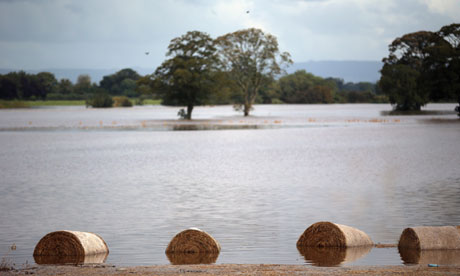 |
| A high proportion of the most valuable agricultural land is at risk of flooding, the MPs said. Photograph: Christopher Furlong/Getty Images via The Guardian |
Ministers are failing to protect the UK's most valuable farmland from flooding, posing a long-term risk to the security of UK food production, according to an influential group of MPs.
A run of poor weather since 2011 has led to extensive flooding of properties but has also severely dented the production of many foods, with the UK now being a net importer of wheat.
The environment select committee's report also said the government's spending by the Department for Environment, Food and Rural Affairs (Defra) to protect homes from flooding is not keeping pace with the rising risk, which is increasing as climate change intensifies downpours, and were also failing to act effectively to block the building of new homes on floodplains.
"Record rainfall in the past two years has led to extensive flooding, cost the economy millions and caused disruption and distress to householders and communities across the UK," said Anne McIntosh, a Conservative MP, and chair of the commons select committee on environment, food and rural affairs.
Extreme weather events are not just a problem for the UK. In a related article, the Guardian reports on the new UN World Meteorological Organization report that points out the unprecedented climate extremes seen around the world over the last decade.
If you think the world is warming and the weather getting nastier, you're right, according to the United Nations agency committed to understanding weather and climate.
The World Meteorological Organization says the planet "experienced unprecedented high-impact climate extremes" in the ten years from 2001 to 2010, the warmest decade since the start of modern measurements in 1850.
Those ten years also continued an extended period of accelerating global warming, with more national temperature records reported broken than in any previous decade. Sea levels rose about twice as fast as the trend in the last century.
A WMO report, The Global Climate 2001-2010, A Decade of Climate Extremes, analyses global and regional temperatures and precipitation, and extreme weather such as the heat waves in Europe and Russia, Hurricane Katrina in the US, tropical cyclone Nargis in Myanmar, droughts in the Amazon basin, Australia and East Africa, and floods in Pakistan.
Looking at something a bit lighter, let's learn how to make an excellent lamb kofte, shall we? Felicity Cloake writes in the Word of Mouth blog about the process. As an aside, this is part of a series of posts; How to Cook the Perfect. And this is how you present a recipe in a blog post, people. We've really got to up our game. This gives you the information you need, the context to work from, and a sense that maybe the writer has actually tried to make the recipe (I'm reminded of the scene in Julie and Julia where Julia Child discovers that Ms. Rombauer hasn't checked the recipes in Joy of Cooking to see if they even work). It's like linking to source articles when writing an opinion piece--it adds a level of verifiability to your work.
So here's Felicity herself to tell you about the process of making kofte.
There's also a report that world food prices have fallen--not much, but still...
Global food prices fell 1% in June due to improving supply prospects, the United Nations' food agency has said , raising forecasts for wheat and maize output in the new season.That puts food prices below the threshold for civil unrest, according to NECSI--the New England Complex Systems Institute, about whom I've blogged before.
Food prices spiked during the summer of 2012 due to a historic drought in the US but prospects for a rebound in global grain supply and good weather forecasts are now weighing on markets.
The Food and Agriculture Organisation's (FAO) price index that measures price changes for a basket of cereals, oil seeds, dairy, meat and sugar, fell for a second month running to 211.3 points in June – its lowest level since February.
If you haven't discovered it yet, there's a lovely interactive map sponsored by The economist that lets you see where you--and pretty much everyone else, ranks in terms of food security. Click on your country (or the country you're interested in) and pull up the world ranking of food security and what went into generating that rank. Canada, by the way, ranks 8th worldwide. Among the key findings?
- Falling national incomes hurt food security in some developed countries over the past year.
- Greece recorded the steepest fall among developed nations, dropping six places. Greece’s GDP has plummeted by more than 20% since the 2008-09 global recession. Income per person dropped in most advanced economies in the past year, the result of weak economies. Although this reduced food security in these countries, they remain, for the most part, in the top 20% of the index and thus are not in serious danger of food insecurity.
And, finally, if you're not following the Journal of Peasant Studies, you're missing out. Open source, peer reviewed.
No comments:
Post a Comment